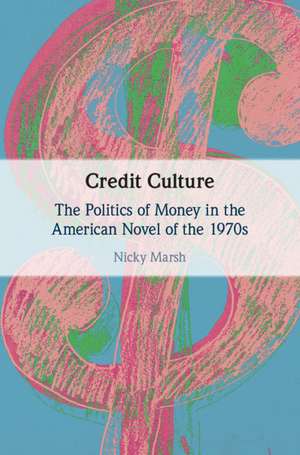Credit Culture: The Politics of Money in the American Novel of the 1970s
Autor Nicky Marshen Limba Engleză Hardback – 15 iul 2020
Preț: 586.19 lei
Preț vechi: 658.64 lei
-11% Nou
Puncte Express: 879
Preț estimativ în valută:
112.22€ • 116.65$ • 93.04£
112.22€ • 116.65$ • 93.04£
Carte tipărită la comandă
Livrare economică 06-20 februarie 25
Preluare comenzi: 021 569.72.76
Specificații
ISBN-13: 9781108836470
ISBN-10: 110883647X
Pagini: 280
Dimensiuni: 158 x 235 x 18 mm
Greutate: 0.49 kg
Editura: Cambridge University Press
Colecția Cambridge University Press
Locul publicării:New York, United States
ISBN-10: 110883647X
Pagini: 280
Dimensiuni: 158 x 235 x 18 mm
Greutate: 0.49 kg
Editura: Cambridge University Press
Colecția Cambridge University Press
Locul publicării:New York, United States
Cuprins
Introduction; Money in the disciplines; postmodern times: E.L Doctorow's Ragtime; 1. No place like home: the cultures of American credit; 2. Don Delillo and American credit; 3. William Gaddis and corporate credit; 4. When women counted: feminism, fiction and the money economy; 5. Toni Morrison and the promise to pay; 6. Dorothy's endless return: sacrifice and gender in the novels of Thomas Pynchon.
Notă biografică
Descriere
The book re-reads the postmodern novel, presenting the ending of the gold standard as a moment of continuity rather than radical change.
